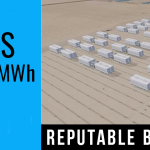
The transport sector has been quick to embrace electrification with robust adoption of lithium-ion battery storage technology in mobility, and grid infrastructure is following suit. Now, it appears the maritime industry is getting in on the action.
IHS Markit energy storage research and analysis manager Julian Jansen confirms the trend, telling pv magazine “Aggressive carbon reduction goals by governments and industry, as well as the need to reduce fuel consumption and maintenance costs are driving the use of battery technology in marine vessels. Battery technology can be utilized either as part of hybrid systems or to fully electrify ships.”
Such progress was evident at the three-day Electric and Hybrid Marine World Expo, held in Amsterdam last week.
German battery manufacturer Akasol AG, for example, promoted its role in powering the new hybrid superyacht developed by Italian company Cerri Cantieri Navali S.p.A., with its first generation AKASystem 15 OEM battery system used in the vessel.
Battery powered yacht
Akasol said the yacht can travel short distances with an electric cruising peak of 8 knots and can anchor under electric power with the lithium-ion battery system for up to 17 hours. The German company also presented its second generation AKASystem OEM PRC, which it said will offer 33% more energy than its precursor and can achieve 2 C charge rates.
Nidec ASI S.p.A. was also steering toward clean power boating with the launch of new batteries for the sector at the exhibition in the Netherlands. Its new batteries differ from others on the market due to a “single large string” feature the company says will make it possible to reduce the number of modules in each battery pack and the number of converters.
“Marine transport alone produces 13% of greenhouse gas emissions and on current projections emissions are expected to rise by at least 50% by 2050 under a business-as-usual scenario,” said Anil Srivastava, CEO of storage provider Leclanché.





